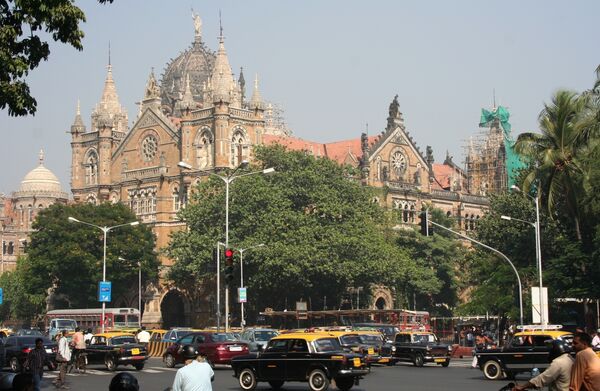MOSCOW. (RIA Novosti political commentator Dmitry Kosyrev) - During a parade on the embankment of Mumbai (formerly Bombay) on the anniversary of last year's hideous terrorist attack, the police showed new weapons and armored vehicles.
The parade followed the route of the terrorists, passing by the city's two best hotels and the famous railway station, which looks like a huge Catholic cathedral.
Last year ten young people, well-trained and armed to the teeth, arrived by boat from neighboring Pakistan and killed 166 people in the course of 60 hours.
It was a unique act of terror, which called into doubt our ability to stop such actions as a seizure of a city center by a small group of people.
This terrorist attack did not affect India's domestic policy. The ruling Indian National Congress has won the general elections. Surprisingly, no major changes have taken place in India's foreign policy but the reason for that is simple: any attempts to counter the threat emanating from Pakistan seemed pointless.
During this anniversary Indian Prime Minister Manmohan Singh paid a visit to Washington D.C. He told the American audience that when Pakistan was ruled by the military leader Pervez Musharraf, who was not an ardent champion of democracy, it was at least clear whom to call. This is no longer possible now that Pakistan is ruled by President Asif Zardari and Prime Minister Yusuf Raza Gilani, who are not on very good terms.
Needless to say, India broke off political dialogue with Pakistan. After an exchange of letters between New Delhi and Islamabad, which lasted for months, Pakistan finally charged seven people with "complicity" in the events in Mumbai. One of the ten terrorists (others were killed) will go on trial in India.
However, there is no guarantee that these actions will help the world reach its main goal, which Singh described as "the destruction of the infrastructure of terrorism."
It appears that nobody knows how to attain this goal. The unprecedented 9/11 attacks in New York and the massive act of terror in Mumbai originated in the same barely controlled part of the world. For all the reservations about their names, Al-Qaeda, which was in charge of 9/11, and Lashkar-e-Taiba, which was behind the Mumbai attacks, are links of the same chain. It is believed that this chain was set up by Pakistani secret services, and not without participation of their American colleagues.
Indians maintain that the Pakistani military could easily destroy the infrastructure of terrorism and should be encouraged to do so. The weak Pakistani government should be given some guarantees of survival after doing this.
Americans were much more radical in their moves. They simply occupied Afghanistan after the war in the winter of 2001-2002. The results were negligible in both cases. There is no guarantee against new major raids in any part of the world. There are places like Somalia, where people limit their activities to such trifles as piracy on one of the world's busiest routes by sheer accident. Nobody knows how to cope with these problems.
At any rate, nobody knew this in the strange transitional world which emerged in the 1990s - an uncontrollable world of illusions about the "only super power" and globalization under one and the same pattern. It is obvious now that this world will never come back but it is not clear what system of global management will replace it. It is being created by test and trial before our eyes.
The anniversary of the act of terror in Mumbai is an excellent illustration of this process because on that day U.S. President Barack Obama met with Indian Prime Minister Manmohan Singh in Washington D.C. Their conversation primarily revolved around Mumbai, Pakistan and terrorism. Obama is expected to announce a new strategy in Afghanistan and Pakistan on December 1, and it will have nothing to do with retreat or withdrawal. India, a key country in the region, did not take part in U.S. policy before, but this absurdity had long been obvious.
It is not yet clear what the two leaders agreed on in Washington. Obviously, the United States is no longer on Pakistan's side. Now Americans and Indians are fighting terrorism together. India is grateful to Obama for his role in putting the Pakistani "suspects" on trial. The United States alleviated India's discontent after Obama's visit to Beijing, where some statements were made about China's role in the Afghan-Pakistani context. India still distrusts China, which is a weakness on its part, and had to be reassured on this score.
Singh is going to visit Moscow in the near future. It will be interesting to see whether his negotiations in Russia will concern Afghanistan and Pakistan. Moscow is seriously concerned about Washington's vague position on Afghanistan. Americans are making some general statements about cooperation, but in anticipation of the new strategy old American officials are discussing Afghanistan with their Russian counterparts as if George W. Bush were still in the White House.
For the time being we do not see any outlines of regional or global policy on what is the main source of the universal threat. Nor do we see anything similar to a precedent, which would help us deal with this threat. Should it be countered with peace, war, occupation or reforms? But something is happening. And that is the difference with the desperate stalemate a year or two ago.
The opinions expressed in this article are the author's and do not necessarily represent those of RIA Novosti.



